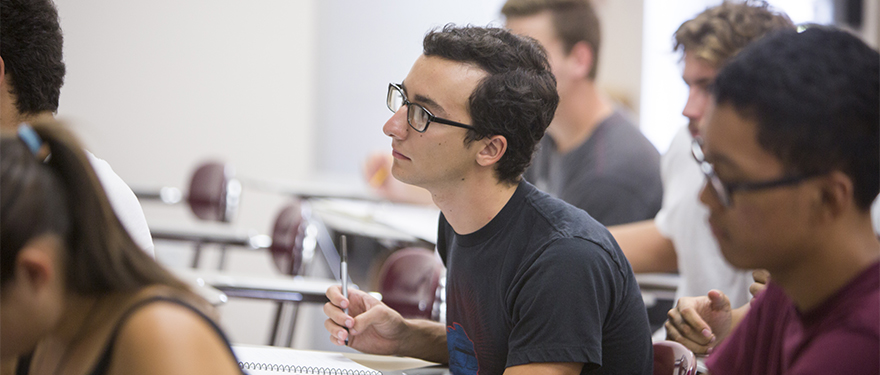Mechanical Engineering
What is Mechanical Engineering?
Mechanical engineering is a diverse subject that addresses the need to design machines and devices that advance humanity. In a nutshell, mechanical engineering deals with anything that moves and almost anything that is made. This may include autonomous and human controlled robots, air and spacecraft, engines, transportation, biosensors, microelectromechanical sensors (MEMs), energy systems, theme parks, automation, manufacturing, medical devices, active prosthetics, adaptive technologies, and so much more. Mechanical engineers must understand the loads and thermal processes in order design the systems that cool and heat our indoor environments, power our machines, spur the designs of our community infrastructure and safety systems. The American Society of Mechanical Engineers has 36 different technical divisions, exhibiting the diversity of the field. LMU's Mechanical Engineering major seeks to provide its students with the range and depth of skills to be sure that these designs function as required, are aesthetically appropriate, safe to use, ethically and environmentally sound.
The Mechanical Engineering program at LMU provides a solid engineering foundation and the breadth from wide exposure to other disciplines and people through its core curriculum, its Jesuit mission-based greater community experiences, and its opportunities for a broad range of activities. Graduates will have a unique depth and ability to communicate their designs to a wide variety of audiences. With an eye toward satisfying the specifications and constraints of their profession, LMU Mechanical Engineering majors examine the economics, social impact, marketability, manufacturability, product support, environmental impact, safety, and final disposition of their designs.
What do Mechanical Engineering majors do?
Mechanical Engineering majors immerse themselves in a high quality, practice and research-oriented, design-focused curriculum that serves as preparation for practice and leadership in industry as well as graduate studies. Initially, they learn the underlying mathematics and science tools to effectively support their studies in mechanical engineering. Later study is heavily focused on the fundamental mechanical engineering knowledge needed to become effective engineers. In the senior year, students can customize their studies by choosing from technical elective courses. Their education culminates in a team-based, yearlong capstone design project, with projects including industry-sponsored projects, student design competitions, and service-based projects. Students are actively mentored by the faculty, encouraged to team with their cohort students while doing their work, and study a lot. They are often involved in numerous clubs, community service events, intramural sports leagues, travel on alternative breaks and study overseas, pursue internships, and much more.
Is this major right for you?
You might be a Mechanical Engineering major if you:
- Are both creative and disciplined
- Like working with machines
- Enjoy using math and science
- Are curious about how things work
- Care about technology, people, and the environment
About our faculty
Our faculty members are experts in a range of mechanical engineering fields, such as metallurgical engineering and materials science; controls, vibrations, and dynamic systems; analysis of fluid flow; engineering mechanics and structural design; nanotechnology; rapid prototyping and computer-aided design and manufacturing; heat transfer and thermal systems design; engineering education and assistive technologies. Our faculty members are active researchers who write articles in engineering journals, make presentations at conferences, earn funding from organizations such as the National Science Foundation, serve on the editorial and advisory boards of journals, and consult in local industries.
About our students and graduates
Our students get internships, are members in professional societies, and participate in wide-ranging community service projects. They participate in national design competitions such as the ASME Student Design Competition and the SAE AeroDesign Competition. Students also have the opportunity to participate in a variety of collaborative research areas such as control systems, energy, rapid prototyping and manufacturing, tribology, and materials. Our graduates go on to graduate schools and/or work for companies such as Boeing, SpaceX, Tesla, and government agencies including NASA. Graduates follow technical and managerial career paths. Some pursue careers as teachers, attorneys, and scientists with universities and research laboratories.
Representative courses
Some of our fundamental courses include:
- Computer Aided Design
- Mechanics of Materials
- Dynamics
- Thermodynamics
- Vibrations
- Materials Science
- Machine Design
- Energy Systems
- Heat Transfer
- Control Systems
Some elective areas of focus include:
- Metallurgical and Materials Engineering
- Composites
- Nanotechnology
- Finite Element Methods
- Robotics
- Computer Aided Manufacturing
- Design for Manufacturing
- Turbomachinery
- Propulsion
- Alternative Energy Systems
